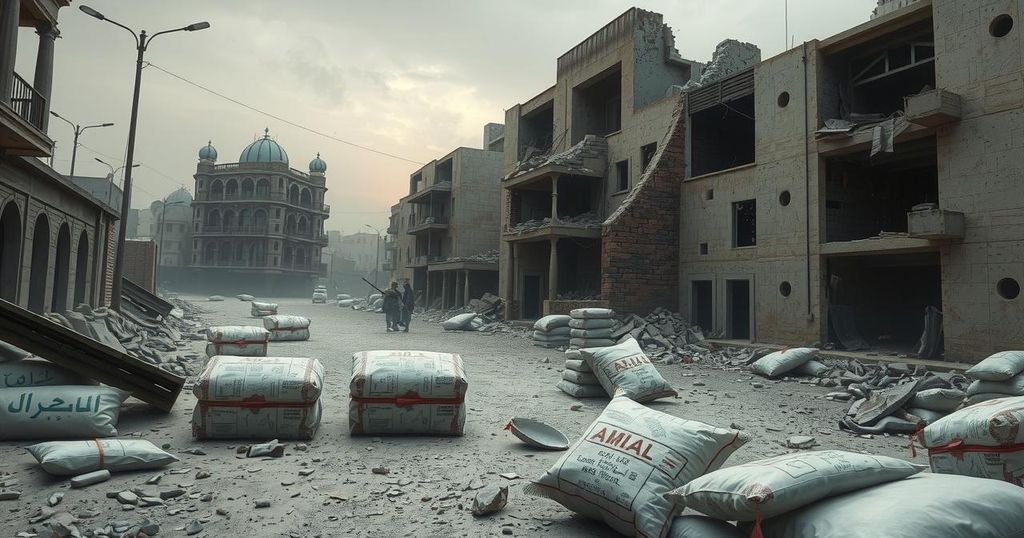Global news
ABIOL LUAL DENG, AFRICA, AL - YARMOUK, ARAB NEWS, CIVIL WAR, DJIBOUTI, EAST AFRICA, EUROPE, EXTREMISM, HUMANITARIAN CRISIS, KHART, KHARTOUM, LONDON, MACRON, MATH, MILITARY, NORWEGIAN REFUGEE COUNCIL, RAPID SUPPORT FORCES, SAF, SECURITY, SUDAN, SUDANESE ARMED FORCES, UNITED KINGDOM, VU
Isaac Bennett
0 Comments
The Ongoing Humanitarian Crisis in Sudan Amidst Military Struggles
The Sudanese Armed Forces have regained control of Khartoum, yet the humanitarian crisis worsens with extensive displacement and hunger. Local aid workers are delivering essential support, but their efforts face threats amidst continuing violence. The RSF retains power in Darfur, complicating prospects for peace. Calls for increased international pressure on both military factions emphasize the urgency of humanitarian efforts.
The military conflict in Sudan has seen the return of de-facto ruler Abdel Fattah al-Burhan to Khartoum, having reclaimed the city from the paramilitary Rapid Support Forces (RSF). The situation remains precarious, with the capital’s infrastructure severely damaged, resulting in widespread displacement and hunger among its residents. Local aid workers have organized crucial humanitarian responses despite limited resources, but their efforts face increasing dangers amid ongoing violence.
The Sudanese Armed Forces (SAF) now control key locations within the capital, including the presidential palace and central bank. However, the potential for stability remains uncertain. The humanitarian crisis continues, with two-thirds of the population requiring assistance. Abiol Lual Deng, a political scientist, warns against assuming that military control equates to peace and underscores the extensive needs of the civilian population.
Analysts emphasize a cautious outlook, suggesting that while the SAF’s military advancements may facilitate some aid access, the larger context of the conflict persists. Many displaced persons are attempting to return to their communities, braving unsafe conditions characterized by a lack of essential services. Dallia Abdelmoniem highlights that civil society must fill the gap where governance fails.
The RSF has not disappeared, having consolidated power in Darfur, where they maintain authority and have established cross-border supply networks. This situation raises concerns about the possibility of continued violence. Abdelmoniem cautions that the SAF’s gains could lead to an aggressive pursuit of a military solution, undermining peace negotiations.
Living conditions remain dire for many in conflict-affected areas. Limited access to humanitarian assistance continues to hamper relief efforts, underscoring the dire need for international action against both conflict parties. As humanitarian organizations strive to provide necessary aid, they face significant challenges amid blockades and logistical obstructions.
The international community’s response has been criticized for its inadequacy. The humanitarian crisis has drawn urgent calls for increased pressure on both the warring parties and their international supporters. Advocates stress that humanitarian needs must be prioritized, regardless of the political situation, as civilians continue to suffer the consequences of ongoing conflict.
In summary, while the SAF may have regained control over Khartoum, the realities on the ground reflect a continuation of violence and distress for the civilian population. A resolution appears distant amid the ongoing humanitarian crisis, and urgent international engagement is required to alleviate suffering and pave the way towards a peaceful solution.
In conclusion, the situation in Sudan remains dire as recent military developments have not translated into a sustainable peace for civilians. The humanitarian crisis is increasingly severe, with significant portions of the population in need of assistance. Local aid efforts are critical but fragile, hampered by ongoing violence and infrastructure destruction. The international community must urgently address these challenges to mitigate suffering and foster a resolution to the conflict.
Original Source: www.arabnews.com




Post Comment